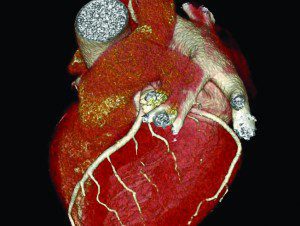

While a healthy diet and exercise plan can play a significant role in preventing such diseases, it’s also vital to make regular appointments with a physician to ensure all your risk factors are in check. “Regular cardiovascular screening is important because it helps you detect risk factors in their earliest stages,” said Barry A. Franklin, Ph.D., director at William Beaumont Hospital in Royal Oak, Mich., and an American Heart Association volunteer. “This way, you can treat the risk factor with lifestyle changes and pharmacotherapies, if appropriate, before it ultimately leads to the development of cardiovascular disease… For many patients, screening results can serve as a wake-up call.”
One such method of screening is the Ultrafast CT Screening of the Heart, which is provided at six Radiology Regional Center locations. Screenings can be conducted with or without an order from your primary care physician, so those wanting to take initiative with their health can do so.
What is an Ultrafast CT Screening of the Heart?
The Ultrafast CT Screening of the Heart is a quick and simple test which assesses your risk of heart attack by detecting and measuring the amount of calcium build-up in your coronary arteries.
The test allows the radiologist to determine whether a patient has a serious risk of degree of plaque burden in the coronary arteries. More importantly, it allows physicians to find hardened arteries early, allowing treatment with medication and lifestyle changes.
This is a screening that can precede more invasive tests such as a stress test and angiogram. The Ultrafast CT Screening of the Heart is considered to be one of the best available tests to predict the risk of heart attack in apparently healthy people.
Why should I get an Ultrafast CT Screening of the Heart?
The CT or CAT scanner acquires approximately 92 images of the heart. The quantity of calcium build-up in your arteries is then determined and you are given a score which falls under a certain category. This information, along with other indicators, can present an overall picture of your heart’s health. As a result, you and your physician can select the most appropriate care plan.
The Ultrafast CT Screening of the Heart is the only readily available, non-invasive, and sensitive screening test for coronary artery disease. The test is strongly recommended for patients with significant risk factors such as smoking history, high cholesterol, weight problems, or family history of heart disease.
What is the preparation for an Ultrafast CT Screening of the Heart?
There are no dyes, no needles, no fasting and no pain. The only preparation required for the Ultrafast CT Screening of the Heart is for the patient to complete a standard medical history questionnaire at the time of his appointment.
How long does the procedure take?
The scan takes 15 minutes or less. The scanner acquires a series of x-ray images of your heart while you hold your breath for 23 seconds. Results will be sent to you in three to four business days.
What does my cardiac score mean?
• Score 0 (Zero): No identifiable atheroscleriotic plaque (a negative examination). Adherence to general guidelines on diet and exercise are stressed.
• Score 1 to 10: Minimal identifiable plaque. Significant obtrusive coronary disease is unlikely.
• Score 11 to 100: Definite but mild plaque. Risk factor modification is recommended, clinical follow-up is necessary.
• Score 101 to 400: Definite, moderate plaque. Risk factor modification is recommended with non-invasive stress testing preparatory to an exercise program. Clinical follow-up and further testing such as stress test, nuclear test, cardiac ultrasound or other studies should be considered.
• Score over 400: Significant plaque burden indicating a high likelihood of “significant” coronary stenosis. Aggressive risk factor modification is recommended with non-invasive stress testing and possibly angiography.
What is the cost and is it covered by insurance?
The Ultrafast CT Screening of the Heart costs only $99! As with most screening tests, your CT scan is not covered by insurance or Medicare at the present time. Payment is due when services are rendered.
Why should I go to Radiology
Regional for this?
Radiology Regional Center is an experienced and trusted leader in Southwest Florida’s diagnostic healthcare. Our physicians and technologists are skilled in the use of CT technology for both screening and diagnostic purposes. Your scan will be performed on the same CT scanners that local physicians rely on for their patients. To make an appointment, call our scheduling team at 239.936.4068.
Radiology Regional Center
(239) 936-4068
radiologyregional.com
 Southwest Florida's Health and Wellness Magazine Health and Wellness Articles
Southwest Florida's Health and Wellness Magazine Health and Wellness Articles

